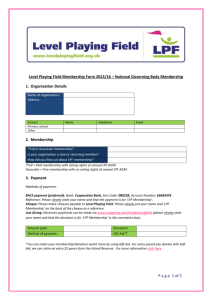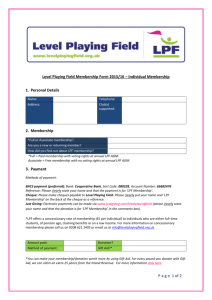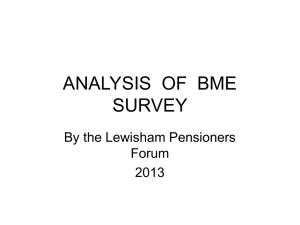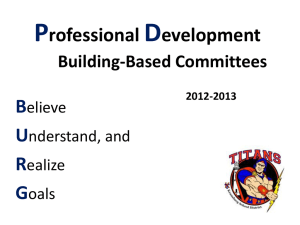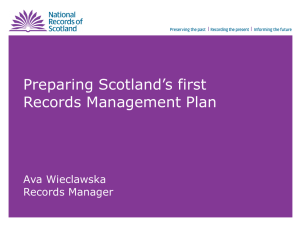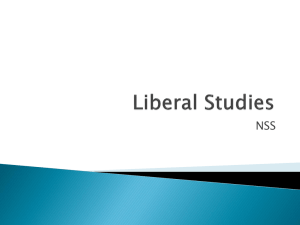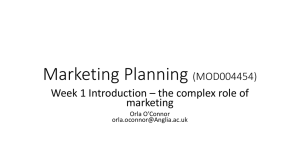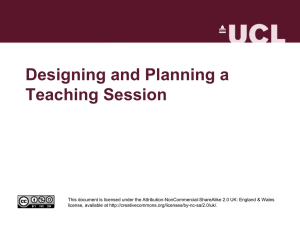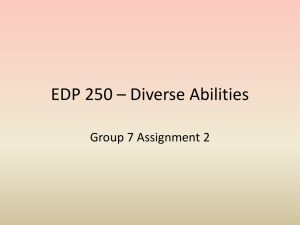Designing an Effective Writing Programme with Reference to the
advertisement
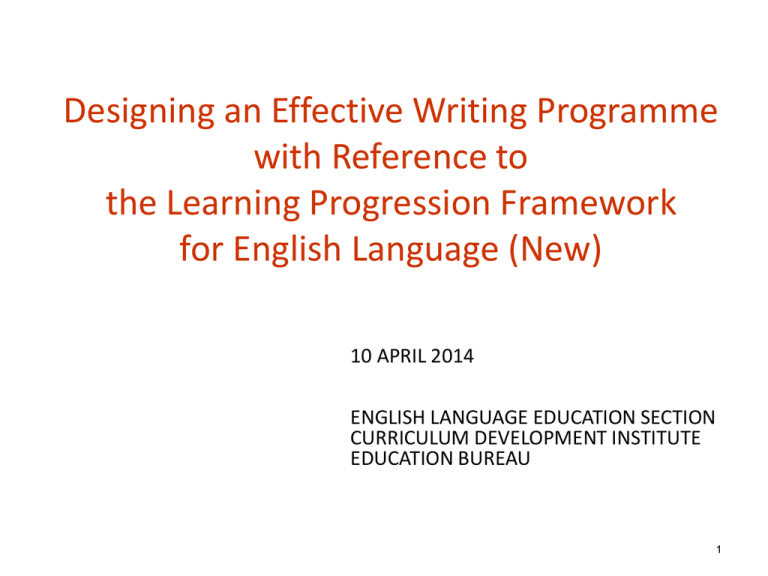
Designing an Effective Writing Programme with Reference to the Learning Progression Framework for English Language (New) 10 APRIL 2014 ENGLISH LANGUAGE EDUCATION SECTION CURRICULUM DEVELOPMENT INSTITUTE EDUCATION BUREAU 1 Objectives » To introduce the LPF for English Language as a reference tool to design a school-based writing programme and plan for the progressive development of writing skills at the upper primary level; » To provide suggestions on how to fine-tune the existing writing programme by including stimulating writing tasks; and » To provide hands-on activities to examine students' work and introduce effective strategies to give quality feedback and promote assessment for/as learning. 2 Run-down of Today’s Programme 2:00 – 2:10 PM Registration 2:10 – 3:00 PM Identifying the key components of a Writing Programme with reference to the Learning Progression Framework (LPF) 3:00 – 3:45 PM Fine-tuning the School-based Writing Programme 3:45 – 4:00 PM Break 4:00 – 4:45 PM Using the LPF to Give Constructive Feedback and Promote Assessment for/as Learning 4:45 – 5:00 PM Q&A 3 Activity 1 In groups, 1. Describe your students’ writing abilities; Motivation Writing ideas Writing performance, e.g. content, organisation, language 2. Share how you develop your students’ writing skills. 4 What is a Learning Progression Framework (LPF)? The LPF: • represents the growth of learners on a developmental continuum as they work towards the Learning Targets and Objectives of the English Language curriculum; • is made up of Learning Outcomes organised under the four language skills and divided into eight levels of attainment; • helps teachers better understand and articulate learners’ performance; and • helps teachers plan strategically how to enhance English Language learning, teaching and assessment. Learning Outcomes 8 ……… ……… 7 ……… ……… 6 ……… ……… 5 ……… ……… 4 ……… ……… 3 ……… ……… 2 ……… ……… 1 ……… ……… Level 5 Figure Illustrating the Structure of the LPF for English Language LOs organised & presented under the four language skills LOs for each language skill expressed in the form of outcome statements (a general description of learner performance) Outcome Statements Pointers provide specific examples of what learners are able to do in demonstrating the LOs. Exemplars illustrate the expected student performance. Exemplars Underlying Principles Underlying Principles elucidate some of the learning objectives which do not lend themselves to the description in terms of 8 levels of attainment but are essential to English language learning. 6 Aspects of Progression shown in the Productive and Receptive Skills Productive Skills Speaking Writing The outcome statements show the progression in terms of: • Content, Organisation and Communication Strategies • Language • Pronunciation, Stress, Rhythm and Intonation • Content • Organisation • Language and Style Underlying Principles Reading Underlying Principles Receptive Skills Listening The outcome statements show the progression in terms of: • Depth of processing information, ideas and feelings • Text complexity • Range and application of strategies Underlying Principles 7 Activity 2 In groups, 1. study the outcome statements of the LPF for Writing; 2. sequence them so that they form a developmental continuum of eight levels, based on your personal / teaching experience; 3. Study three exemplars chosen from the e-LPF, identify the levels and use the pointers to comment on the writings. 8 Activity 3 In groups, 1. study the writing plans of two schools; and 2. comment on the strengths and weaknesses of the plans. 9 Lack of motivation Lack of ideas Inconsistent use of tenses writing problems Poor language Incoherent unit plan Poor organisation Insufficient vocabulary 10 DESIGNING A SCHOOL-BASED WRITING PROGRAMME (CONTENT) Pointers from Levels 3 – 5 Lack of ideas 1. 2. Raising awareness of text type features 3. 4. 5. 6. Using graphic organisers to expand/elaborate ideas 7. 8. Write and reply to short and simple letters to share personal experiences Write short and simple descriptions of objects, people, places and events Write short and simple stories Write and reply to simple letters to share personal experiences Write simple descriptions of objects, people, places and events with some details Write some formal letters to make simple requests and enquiries Write a range of simple texts to describe, recount, record, explain and propose with some supporting details Write stories with a setting, a simple plot and simple characterisation 11 DESIGNING A SCHOOL-BASED WRITING PROGRAMME (LANGUAGE AND STYLE) Pointers from Levels 3 – 5 Poor Language Insufficient vocabulary 1. 2. 3. 4. Inconsistent use of tenses 5. 6. Use a small range of vocabulary on familiar topics, with most words correctly spelt and some word collocations correct Use a range of adjectives/adjective phrases to describe and compare with some consistency Use a small range of adverbs/adverbial clauses for some communicative functions with some consistency Use a small range of tenses and passive voice with some consistency Use modals for some communicative functions with consistency Show an awareness of using some stylistic features (e.g. using dialogues in stories to create interest, use headings and subheadings to clarify presentation) to support the purpose of text 12 DESIGNING A SCHOOL-BASED WRITING PROGRAMME (ORGANISATION) 1. 2. Poor organisation 3. 4. 5. 6. 7. Pointers from Levels 3 – 5 Establish links using some simple cohesive devices with some consistency Arrange ideas in a short text using short and simple means (e.g. sequencing events chronologically) to show a generally clear focus Arrange ideas in a short text using simple means (e.g. providing illustrations or explanations) to show a generally clear focus Structure the text using paragraphs, including a brief introductory and/or concluding statement Establish links within some paragraphs using a range of cohesive devices with some consistency Arrange ideas in some paragraphs using different means (e.g. using topic sentences) Structure the text using paragraphs 13 DESIGNING A SCHOOL-BASED WRITING PROGRAMME Underlying Principles Lack of Motivation Designing meaningful writing tasks 1. Language development strategies, generic skills, and positive values and attitudes are essential to English Language learning and should form an integral part of the learning-teachingassessment cycle. 2. The meaningfulness and appropriateness of the written texts to the context, purpose and audience are implicit in and apply across all the learning outcomes. 14 DESIGNING A SCHOOL-BASED WRITING PROGRAMME Underlying Principles Incoherent unit plan 3. The development of writing strategies does not readily lend itself to descriptions in all of the eight levels of learning outcomes, e.g., • Reflect on current teaching practice Provide support in the L&T process • • • generating ideas by brainstorming or seeking and selecting information and ideas from different sources revising drafts by adding, deleting, substituting or linking ideas editing drafts by correcting errors in language reflecting on own writing based on feedback from teachers or peers 4. Teacher support is essential to helping learners express and organise their ideas during the learning and teaching process. As learners progress, the amount of support provided could be gradually reduced to promote learner independence 15 15 Activity 4 In groups, 1. share interesting writing topics; 2. share ideas and strategies to scaffold the writing skills of the less able students; and 3. share ideas and strategies to stretch the abilities of the more able students. 16 Improving Students’ Vocabulary Building Strategies Dimensions of vocabulary knowledge Collocation (e.g. look at the painting) Forms (e.g. paint, painter, painting) Vocabulary Meaning Functions (e.g. singulars/plurals: a painter, painters parts of speech: paint, painting, painted ) 17 Improving Students’ Vocabulary Building Strategies Approaches in vocabulary learning AREA OF FOCUS Paradigmatic Approach help pupils expand the size of vocabulary Syntagmatic Approach help pupils understand the usage of the vocabulary 18 Improving Students’ Vocabulary Building Strategies Syntagmatic Approach Topic: Jobs PEOPLE ACTIONS OBJECTS PLACE Chef cook meals restaurant Teacher Singer Pilot 19 Improving students’ writing skills in the Organisation of Ideas Introducing the text type features, format and layout to students explicitly Raising students’ awareness of the organisation of the text, e.g. through dicto-comp, sequencing events The format of a personal letter Strategies to stretch students’ writing abilities Non-fiction Manuals for playing Personal letters new toys Recounts Giving advice Biography/ Autobiography Recipes News reports Journal Writing P4 Imaginative stories Fairy tales P5 Fantasy Fables Fiction P6 To engage students in interesting and meaningful writing activities and to stimulate students to think and write creatively and critically Writing at KS3 Adventures Dilemma To enhance students’ writing skills progressively to ensure a smooth transition between P6 and S1 21 Strategies to stretch students’ writing abilities Providing opportunities for students to write creatively and critically Some principles: 1. Go beyond the given information 2. Allow time to think 3. Strengthen creative abilities, e.g. • • • look at a situation from several perspectives break away from traditional patterns of thought teach creative thinking techniques http://www.edb.gov.hk/creativethinking_pri 22 Activity 5 In groups, 1. analyse the strengths and weaknesses of the following assessment rubrics: Marking scheme Peer assessment forms 2. make suggestions on areas for improvement with reference to the LPF. 23 Steps in Designing an Effective Writing Programme Key components Learning & Teaching Strategies Assessment as/for learning • engaging students in a range of tasks that cover a variety of purposes and text types • developing writing skills progressively • catering for diverse learning abilities • developing strategies to approach the writing tasks • providing support for students to • • • • develop vocabulary building strategies understand features of different text types express personal ideas/experience write with imaginative ideas • identifying the requirements for each task in terms of the three domains in the LPF • guiding students to improve the first draft based on constructive feedback from teachers and/or peers using task specific feedback sheet 24
